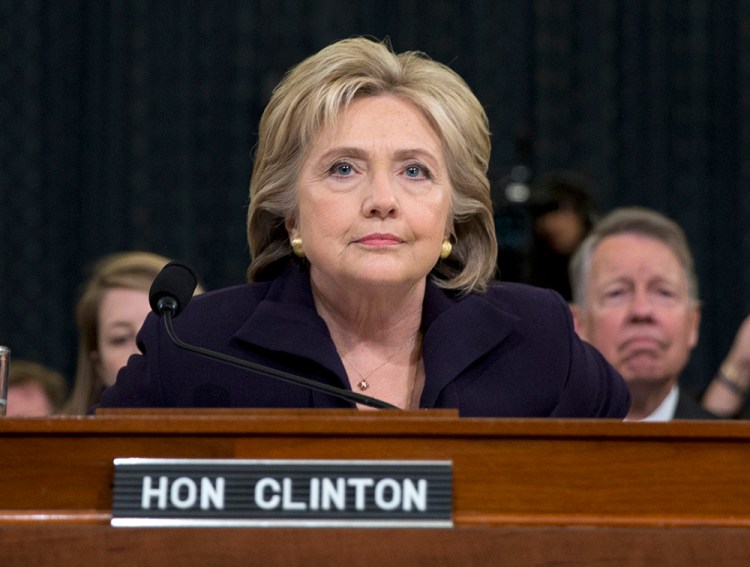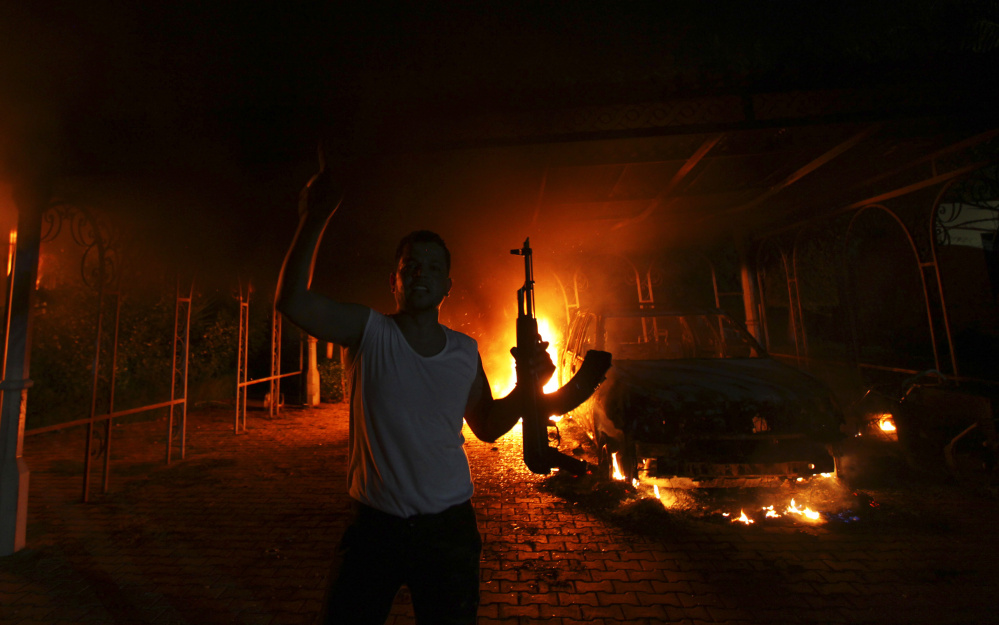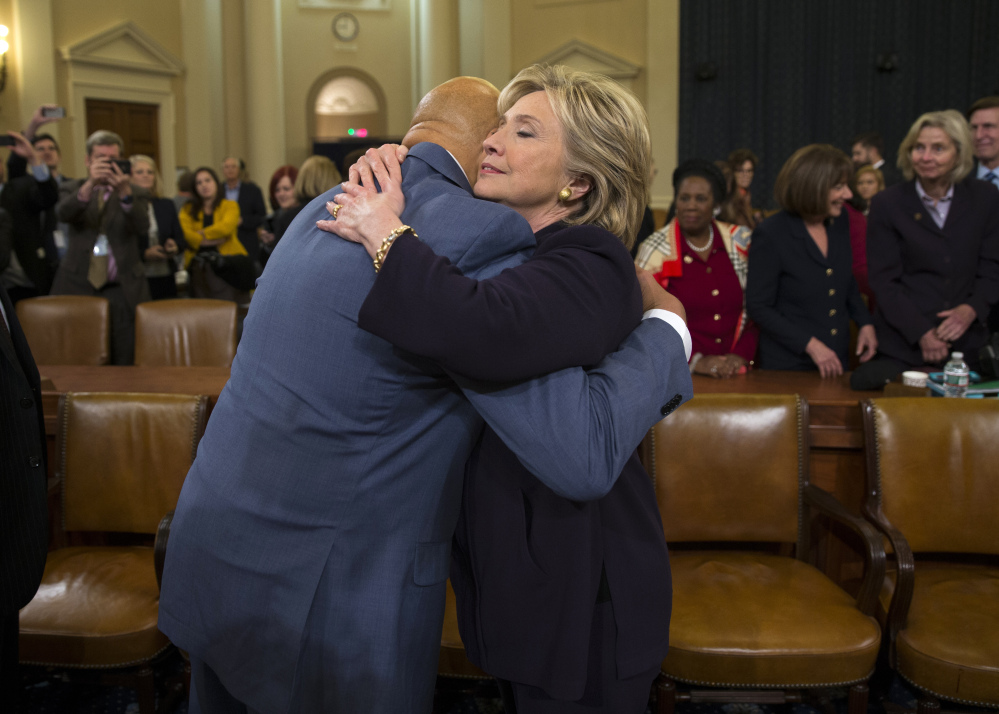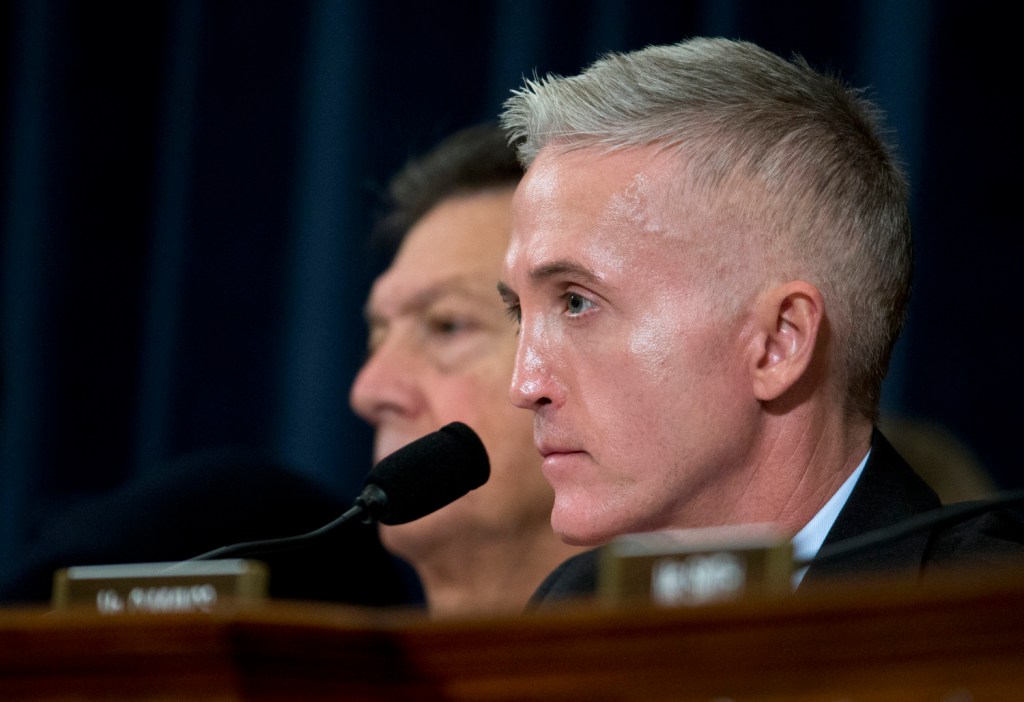WASHINGTON — Hillary Clinton easily parried barbed Republican questioning Thursday about the deaths of four Americans in Benghazi, Libya, emerging unscathed from a high-stakes congressional hearing with a smooth and sometimes poignant account of her role in an event that has loomed as one of her largest political liabilities.
Just over a year before the 2016 general election, the long-anticipated showdown was suffused with presidential politics – although neither Clinton nor members of the House Select Committee on Benghazi mentioned her position at the top of the Democratic field.
Both she and her Republican questioners claimed the high ground, insisting that they were focused on learning what went wrong when militants overran two U.S. compounds in the restive Libyan city in September 2012, just months before Clinton left office as secretary of state.
Democrats defended Clinton’s leadership and repeatedly accused Republicans of using the special investigative panel to hunt for damaging information about her.
“I would imagine I’ve thought more about what happened (in Benghazi) than all of you put together. I’ve lost more sleep than all of you put together,” Clinton said. “I have been racking my brain about what more could have been done or should have been done.”
Republicans sought to establish a link between Clinton’s decision-making – before and during the attacks – and the four deaths, but they clearly struggled to build a theory of the case that she was directly responsible or negligent.
They also hurt their own cause at times. Several spent their 10-minute periods on peculiar lines of questioning: One pressed Clinton repeatedly about an email exchange between two State Department staffers whom Clinton said she did not know. Much of the hearing was also consumed by bickering between Republicans and Democrats on the panel, leaving Clinton to sit by, sometimes shuffling papers or resting her chin on her hand.
U.S. Ambassador J. Christopher Stevens and three others were killed in a chaotic, hours-long assault that revealed serious gaps in security and communications but not, Clinton claimed, a failure of leadership or policy.
“This was the fog of war,” Clinton said after an emotional recounting of harrowing events that included the failed attempt to rescue Stevens and the gut-wrenching hours that followed when the State Department could not account for his whereabouts.
The hearing comes at a moment when Clinton is re-establishing herself as the clear front-runner for the Democratic presidential nomination after several months in which her poll numbers had nose-dived. Her stumble came in part because of her handling of a controversy over her use of a private email account while she was secretary of state – an unorthodox practice that was unearthed by the panel she appeared before on Thursday.
MORE IN CONTROL THAN IN 2013
In recent days, Clinton has recovered much of her advantage.
She has built upon her strong performance at the first Democratic debate on Oct. 13. She also got a stroke of good fortune when Vice President Joe Biden ended months of speculation with an announcement Wednesday that he would not seek the Democratic nomination.
As was the case with the debate, the hearing setting was one that played to Clinton’s natural strengths. She kept her composure through the 11-hour session and appeared well prepared for the lines of attack by the Republican members of the committee. As the day wore on, with her command of the proceeding becoming more apparent, she even appeared bored at times.
There was no replay of the famous, and politically damaging, moment from a January 2013 hearing before the Senate Foreign Relations Committee. Then in her final days as secretary of state, Clinton shouted and waved her arms at a Republican senator and demanded, “What difference, at this point, does it make” whether the attacks were premeditated?
This time, Clinton also had the benefits of missteps by Republicans – most notably remarks by House Majority Leader Kevin McCarthy, R-Calif., that the committee investigation had succeeded in damaging Clinton politically. Democrats seized upon that statement as proof that the investigation was motivated by partisanship rather than getting to the bottom of what had happened in Benghazi.
Clinton has called the panel “basically an arm of the Republican National Committee,” but she did not confront her Republican questioners on that point Thursday. She mostly smiled in mute agreement when Democrats called the exercise a partisan fishing expedition or a waste of taxpayer money.
At one point, Rep. Jim Jordan, R-Ohio, suggested the Obama administration tried to whitewash the terrorist origins of the attacks because it undercut the political success that Clinton and others claimed in Libya. “I’m sorry that it doesn’t fit your narrative, congressman,” Clinton responded. “I can only tell what the facts were.”
DOING BUSINESS WITH LIMITED EMAIL
Two of Clinton’s personal attorneys sat behind her during the hearing, underscoring the peril the Benghazi episode and the questions surrounding her emails pose for her. The FBI is investigating whether classified information was compromised through Clinton’s email system, which operated outside the usual State Department procedures and controls.
In her testimony, Clinton said she did not have a computer in her State Department office and did little of her daily work via email.
“I conducted it in meetings,” she said. “I read massive amounts of memos, a great deal of classified information. I made a lot of secure phone calls. I was in and out of the White House all the time. There were a lot of things that happened that I was aware of and that I was reacting to.”
Republicans had wanted to interview Clinton in private, leading to months of negotiations over the terms of her appearance. Her attorneys refused, saying Republicans could selectively leak damaging material from a closed-door session.
Clinton’s disciplined performance, command of facts and pure stamina may bear out her calculation that a public performance would work to her benefit, as well as remind her opponents why she is an imposing candidate.
Conservative columnist Byron York wrote in the Washington Examiner that “a hearing billed as an epic, High Noon-style confrontation . . . instead turned out to be a somewhat interesting look at a few limited aspects of the Benghazi affair. In other words, no big deal. And that is very, very good news for Hillary Clinton.”
ADDRESSING POLITICAL MOTIVE CLAIMS
The day began with the panel’s Republican chairman, Rep. Trey Gowdy, defending the committee’s mission and motives. Much of his opening statement was spent rebutting claims of partisan bias.
“The House of Representatives, including some Democrats, I hasten to add, asked this committee to write the final accounting of what happened in Benghazi,” Gowdy said. He said that despite seven previous inquiries, his panel was the first to interview many witnesses and the first to discover Clinton’s exclusive use of a private email server for her government work.
“Not a single member of this committee signed up to investigate you or your email,” he assured Clinton. “We signed up to investigate and therefore honor the lives of four people that we sent into a dangerous country to represent us, and to do everything we can to prevent it from happening to others. Our committee has interviewed half a hundred witnesses. Not a single one of them has been named Clinton until today.”
Republicans on the committee have repeatedly pressed Clinton about the special access she gave longtime friend Sidney Blumenthal, who sent reports about Libya to the private email address that Clinton used for government business while she was secretary of state.
Why, the panel members asked, could a Clinton loyalist get messages to her inbox while the American ambassador in Libya had to send his concerns about security through official channels.
“Help us understand how Sidney Blumenthal had that kind of access to you, Madam Secretary, but the ambassador did not,” Gowdy said.
Clinton said that was exactly the way the system should work. She said security issues were discussed and resolved by professionals whose work she would not second-guess. She used the question of adequate security to make an impassioned case that the legacy of Benghazi should not be a retrenchment of American engagement in dangerous places.
EFFORTS MADE TO SAVE U.S. DIPLOMAT
Repeatedly, the Republicans were baited by Democrats into fights over whether the committee was a partisan tool, and whether any of them should be there at all. Just before the lunch break, Gowdy and several Democrats got into a loud argument about whether to release Blumenthal’s interview transcripts, while cameras showed Clinton shuffling papers.
“I don’t know what this line of questioning does to help us get to the bottom of the deaths of four Americans,” Clinton said to Gowdy before the intra-committee bickering began.
Democrats repeatedly charged that the majority Republicans were rehashing questions that had been answered in the many inquiries into the only death of a sitting ambassador since 1979.
The committee’s top Democrat, Rep. Elijah E. Cummings of Maryland, claimed Republicans had focused on Clinton to the exclusion of other relevant Cabinet members, including the then-heads of the Defense Department and the CIA.
It was under sympathetic Democratic questioning that Clinton grew pensive and emotional, particularly when recalling Stevens and how he died. She called Stevens a rising star whose deep knowledge of Libya made him her choice to be ambassador. She swore him in for that post.
Clinton gave a detailed account of efforts to bring Stevens and State Department officer Sean Smith to a “safe room” inside the lightly defended diplomatic compound that Stevens was visiting from his headquarters in the capital, Tripoli.
“I wanted to point out that even when we try to get it right, which we do try, sometimes there are unintended consequences, and there is an example out of this tragedy,” Clinton said. “The attackers used diesel fuel to set the compound on fire. And the safe room was anything but safe.”
The security situation in Benghazi was deteriorating rapidly over the summer of 2012, and Stevens had requested additional security measures.
Many of the security requests, she said, were fulfilled, but “others weren’t.”
Send questions/comments to the editors.






Success. Please wait for the page to reload. If the page does not reload within 5 seconds, please refresh the page.
Enter your email and password to access comments.
Hi, to comment on stories you must . This profile is in addition to your subscription and website login.
Already have a commenting profile? .
Invalid username/password.
Please check your email to confirm and complete your registration.
Only subscribers are eligible to post comments. Please subscribe or login first for digital access. Here’s why.
Use the form below to reset your password. When you've submitted your account email, we will send an email with a reset code.